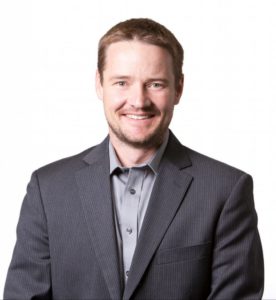To say Jason Quinn has been busy since he joined the Department of Mechanical Engineering as an assistant professor last fall would be an understatement. The Department of Energy (DOE) and the U.S. Department of Agriculture’s (USDA) National Institute of Food and Agriculture (NIFA) have each recognized and funded Quinn’s unique expertise in sustainability.

“It is an exciting time for me to work with great collaborators on a diverse set of challenges focused on bio-based fuels and products,” said Quinn.
Capturing CO2
Earlier this year, the DOE’s Office of Fossil Energy invested $5.9 million in seven projects to advance novel CO2 utilization strategies. Six U.S. universities and research labs were selected to research and develop and test novel approaches that convert CO2 captured from coal-fired power plants to usable products, and to explore methods of capturing CO2 in areas where high-volume uses may not be optimal. About $1.3 million of this investment went directly to the University of Kentucky Research Foundation, who recruited Quinn’s expertise.
Kentucky’s project, “CO2 to Bioplastics: Beneficial Re-Use of Carbon Emissions from Coal-Fired Power Plants Using Microalgae,” is focused on capturing CO2 from coal flue gas through the cultivation of microalgae. The microalgae is then harvested and converted into a variety of bio-based products including plastics and fuels. Developing a process to optimize this system and decrease the cost while maximizing value is also part of the project’s objective.
Algae developments
Quinn is also a partner in another DOE grant aimed at improving how algae-based biofuels and bio products are produced. The project, “Rewiring Algal Carbon Energetics for Renewables,” is funded under a three-year, $3.5 million grant by the DOE’s Bioenergy Technology Office. The overall goal is to double the yield of biofuel precursors from algae to about 3,700 gallons per acre per year.
Quinn, along with Ken Reardon of the Department of Chemical and Biological Engineering, and Graham Peers of the Department of Biology, is tackling algae strain development, researching and improving the efficiency rate of algae sunlight absorption and converting that energy to biomass, and fermenting carbohydrates in the algal cells into ethanol and a fuel precursor. The final element of the project, researched specifically by Quinn, addresses predicting how strain modifications affect the eventual product’s environmental impacts. Quinn’s proficiency in sustainability assessment and experience in simulating advancements of other scientists into working models made him the ideal candidate to research this portion of Colorado State University’s project.
Other partners, including the National Renewable Energy Laboratory (NREL), Colorado School of Mines, Arizona State University (ASU), and industry members, will work mainly on the algae-to-bioproduct life cycle.
“We’re excited to leverage the strengths of all our partners on this important project,” said project lead Lieve Laurens, senior scientist at NREL. “From building on the work already done by Sapphire with the D. armatus strain to ASU’s manipulation of optimal outdoor conditions and CSU’s research to improve photosynthesis in the strain and fermentation of the sugars, each team member is playing an integral role.”
Southwest sustainable bio-economy
Last but not least, the USDA’s NIFA sector has awarded $21.1 million to several institutions to support the development of a new jet fuel, bio-based products, and biomaterials from renewable sources. The University of Arizona recruited the help of Quinn on their project, “Sustainable Bioeconomy for Arid Regions,” a multi-level research project that includes the cultivation of two desert-dwelling crops to create a sustainable bioeconomy.
This project includes the University of Arizona, Colorado School of Mines, Colorado State University, Iowa State University, New Mexico State University, Bridgestone Americas, Inc. and Mecurius Biorefining, Inc., all working towards the development of a sustainable bio-economy in the desert southwest. The project focuses on developing domestic sources of natural rubber from guayule and guar gum from guar. The project is driving towards enhancing rural economics through scientific research dedicated to diversifying crop options for the desert southwest.
Future for Quinn
Quinn is looking forward to two additional projects coming down the pipeline, both sponsored by the DOE Advanced Research Projects Agency-Energy. The first is the assessment of a new macroalgae cultivation concept and the second is looking at the potential of dynamic wireless power transfer for in-motion charging of electric vehicles.
“The exciting thing about sustainability work is the opportunity to collaborate,” Quinn said. “I am continuing to make connections and work with a diverse set of researchers.”